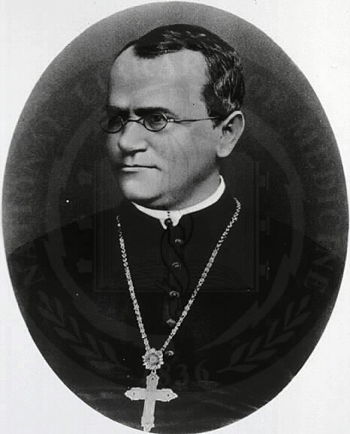Gregor Mendel: Difference between revisions
Jump to navigation
Jump to search

imported>Thomas Simmons No edit summary |
imported>Thomas Simmons mNo edit summary |
||
| (3 intermediate revisions by 3 users not shown) | |||
| Line 1: | Line 1: | ||
{{subpages}} | |||
{{Image|408.jpg|right|350px|Gregor Mendel, St Thomas Monastery, Brünn.}} | {{Image|408.jpg|right|350px|Gregor Mendel, St Thomas Monastery, Brünn.}} | ||
'''Gregor Johann Mendel''' (born Johann Mendel, 22 July, 1822 in Heizendorff, Moravia, died 6 January, 1884 at St. Thomas monastery in Brünn) was a trained scientist who was the first to discover the fundamental principles of inheritance which were essential in establishing the genetic basis of heredity. Gregor Mendel published his research findings in a little known journal, ''Proceedings of the Natural Science Society'' in Brünn (now called Brno in the Czech Republic) in 1865. His work, however, went unnoticed by the scientific community-at-large until 1899 when it was rediscovered by Dutch botanist [[Hugo de Vries]].<ref name=GMendelPrimaryBackground> Gribbin, John, (2003). Science: A History. London: Penguin Books. ISBN 0140297413; [http://www.nlm.nih.gov/hmd/collections/digital/syllabi/harwood1.pdf A History of Heredity- From Mendel to genetic engineering] Jonathan Harwood (2002) University of Manchester, Retrieved from US National Library of Medicine, National Institutes of Health, 25 January, 2009</ref> | '''Gregor Johann Mendel''' (born Johann Mendel, 22 July, 1822 in Heizendorff, Moravia, died 6 January, 1884 at St. Thomas monastery in Brünn) was a trained scientist who was the first to discover the fundamental principles of inheritance which were essential in establishing the genetic basis of [[heredity]]. Gregor Mendel published his research findings in a little known journal, ''Proceedings of the Natural Science Society'' in Brünn (now called Brno in the Czech Republic) in 1865. His work, however, went unnoticed by the scientific community-at-large until 1899 when it was rediscovered by Dutch botanist [[Hugo de Vries]].<ref name=GMendelPrimaryBackground> Gribbin, John, (2003). Science: A History. London: Penguin Books. ISBN 0140297413; [http://www.nlm.nih.gov/hmd/collections/digital/syllabi/harwood1.pdf A History of Heredity- From Mendel to genetic engineering] Jonathan Harwood (2002) University of Manchester, Retrieved from US National Library of Medicine, National Institutes of Health, 25 January, 2009</ref> | ||
{{TOC | {{TOC|right}} | ||
{{editintro}} | {{editintro}} | ||
==References== | ==References== | ||
<references /> | <references /> | ||
[[Category: History Workgroup|History Workgroup]] | [[Category: History Workgroup|History Workgroup]] | ||
Latest revision as of 16:35, 7 June 2009
Gregor Johann Mendel (born Johann Mendel, 22 July, 1822 in Heizendorff, Moravia, died 6 January, 1884 at St. Thomas monastery in Brünn) was a trained scientist who was the first to discover the fundamental principles of inheritance which were essential in establishing the genetic basis of heredity. Gregor Mendel published his research findings in a little known journal, Proceedings of the Natural Science Society in Brünn (now called Brno in the Czech Republic) in 1865. His work, however, went unnoticed by the scientific community-at-large until 1899 when it was rediscovered by Dutch botanist Hugo de Vries.[1]
[]
References
- ↑ Gribbin, John, (2003). Science: A History. London: Penguin Books. ISBN 0140297413; A History of Heredity- From Mendel to genetic engineering Jonathan Harwood (2002) University of Manchester, Retrieved from US National Library of Medicine, National Institutes of Health, 25 January, 2009
